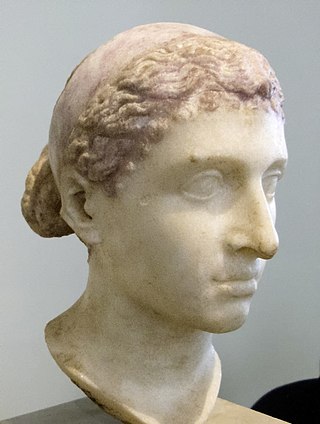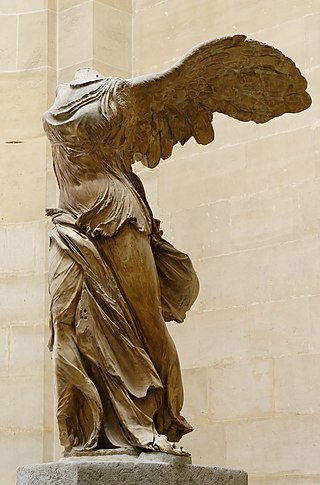A, or a, is the first letter and the first vowel letter of the Latin alphabet, used in the modern English alphabet, and others worldwide. Its name in English is a, plural aes.

Apollo is one of the Olympian deities in classical Greek and Roman religion and Greek and Roman mythology. Apollo has been recognized as a god of archery, music and dance, truth and prophecy, healing and diseases, the Sun and light, poetry, and more. One of the most important and complex of the Greek gods, he is the son of Zeus and Leto, and the twin brother of Artemis, goddess of the hunt. He is considered to be the most beautiful god and is represented as the ideal of the kouros. Apollo is known in Greek-influenced Etruscan mythology as Apulu.

Alexander III of Macedon, most commonly known as Alexander the Great, was a king of the ancient Greek kingdom of Macedon. He succeeded his father Philip II to the throne in 336 BC at the age of 20 and spent most of his ruling years conducting a lengthy military campaign throughout Western Asia, Central Asia, parts of South Asia, and Egypt. By the age of 30, he had created one of the largest empires in history, stretching from Greece to northwestern India. He was undefeated in battle and is widely considered to be one of history's greatest and most successful military commanders.

Athens is the capital and largest city of Greece. A major coastal urban area in the Mediterranean, Athens is also the capital of the Attica region and is the southernmost capital on the European mainland. With its urban area's population numbering over three million, it is the eighth largest urban area in the European Union. The Municipality of Athens, which constitutes a small administrative unit of the entire urban area, had a population of 643,452 (2021) within its official limits, and a land area of 38.96 km2 (15.04 sq mi).

Cyprus, officially the Republic of Cyprus, is an island country in the eastern Mediterranean Sea, north of the Sinai Peninsula, south of the Anatolian Peninsula, and west of the Levant. It is geographically a part of West Asia, but its cultural ties and geopolitics are overwhelmingly Southeast European. Cyprus is the third-largest and third-most populous island in the Mediterranean. It is east of Greece, north of Egypt, south of Turkey, and west of Lebanon and Syria. Its capital and largest city is Nicosia. The northeast portion of the island is de facto governed by the self-declared Turkish Republic of Northern Cyprus.

Greek is an independent branch of the Indo-European family of languages, native to Greece, Cyprus, Italy, southern Albania, and other regions of the Balkans, the Black Sea coast, Asia Minor, and the Eastern Mediterranean. It has the longest documented history of any Indo-European language, spanning at least 3,400 years of written records. Its writing system is the Greek alphabet, which has been used for approximately 2,800 years; previously, Greek was recorded in writing systems such as Linear B and the Cypriot syllabary. The alphabet arose from the Phoenician script and was in turn the basis of the Latin, Cyrillic, Coptic, Gothic, and many other writing systems.

Greece, officially the Hellenic Republic, is a country in Southeast Europe. Located on the southern tip of the Balkan peninsula, Greece shares land borders with Albania to the northwest, North Macedonia and Bulgaria to the north, and Turkey to the east. The Aegean Sea lies to the east of the mainland, the Ionian Sea to the west, and the Sea of Crete and the Mediterranean Sea to the south. Greece has the longest coastline on the Mediterranean Basin, featuring thousands of islands. The country comprises nine traditional geographic regions, and has a population of nearly 10.4 million. Athens is the nation's capital and largest city, followed by Thessaloniki and Patras.
S, or s, is the nineteenth letter of the Latin alphabet, used in the modern English alphabet, the alphabets of other western European languages and others worldwide. Its name in English is ess, plural esses.

Zeus is the sky and thunder god in ancient Greek religion and mythology, who rules as king of the gods on Mount Olympus. His name is cognate with the first syllable of his Roman equivalent Jupiter.

The Greeks or Hellenes are an ethnic group and nation native to Greece, Cyprus, southern Albania, Anatolia, parts of Italy and Egypt, and to a lesser extent, other countries surrounding the Eastern Mediterranean and Black Sea. They also form a significant diaspora, with many Greek communities established around the world.

Cleopatra VII Thea Philopator was Queen of the Ptolemaic Kingdom of Egypt from 51 to 30 BC, and its last active ruler. A member of the Ptolemaic dynasty, she was a descendant of its founder Ptolemy I Soter, a Macedonian Greek general and companion of Alexander the Great. After the death of Cleopatra, Egypt became a province of the Roman Empire, marking the end of the last Hellenistic-period state in the Mediterranean and of the age that had lasted since the reign of Alexander. Her first language was Koine Greek, and she was the only known Ptolemaic ruler to learn the Egyptian language.

Ancient Greece was a northeastern Mediterranean civilization, existing from the Greek Dark Ages of the 12th–9th centuries BC to the end of classical antiquity, that comprised a loose collection of culturally and linguistically related city-states and other territories. Most of these regions were officially unified only once, for 13 years, under Alexander the Great's empire from 336 to 323 BC. In Western history, the era of classical antiquity was immediately followed by the Early Middle Ages and the Byzantine period.

Ancient Greek includes the forms of the Greek language used in ancient Greece and the ancient world from around 1500 BC to 300 BC. It is often roughly divided into the following periods: Mycenaean Greek, Dark Ages, the Archaic or Epic period, and the Classical period.

In classical antiquity, the Hellenistic period covers the time in Mediterranean history after Classical Greece, between the death of Alexander the Great in 323 BC and the death of Cleopatra VII, followed by the emergence of the Roman Empire, as signified by the Battle of Actium in 31 BC and the conquest of Ptolemaic Egypt the following year. The Ancient Greek word Hellas was gradually recognized as the name for Greece, from which the word Hellenistic was derived. "Hellenistic" is distinguished from "Hellenic" in that the latter refers to Greece itself, while the former encompasses all ancient territories under Greek influence, in particular the East after the conquests of Alexander the Great.
The Greek alphabet has been used to write the Greek language since the late 9th or early 8th century BC. It is derived from the earlier Phoenician alphabet, and was the earliest known alphabetic script to have distinct letters for vowels as well as consonants. In Archaic and early Classical times, the Greek alphabet existed in many local variants, but, by the end of the 4th century BC, the Euclidean alphabet, with 24 letters, ordered from alpha to omega, had become standard and it is this version that is still used for Greek writing today.

PAOK FC, commonly known as PAOK Thessaloniki or simply PAOK, is a Greek professional football club based in Thessaloniki, Macedonia. PAOK are one of the top domestic clubs, the most widely supported in Northern Greece.

Olympiacos Club of Fans of Piraeus, known simply as Olympiacos or Olympiacos Piraeus, is a Greek professional football club based in Piraeus. Part of the major multi-sport club Olympiacos CFP, their name was inspired from the ancient Olympic Games and along with the club's emblem, the laurel-crowned Olympic athlete, symbolize the Olympic ideals of ancient Greece. Their home ground is the Karaiskakis Stadium, a 33,334-capacity stadium in Piraeus.

Greek mythology is the body of myths originally told by the ancient Greeks, and a genre of ancient Greek folklore, today absorbed alongside Roman mythology into the broader designation of classical mythology. These stories concern the ancient Greek religion's view of the origin and nature of the world; the lives and activities of deities, heroes, and mythological creatures; and the origins and significance of the ancient Greeks' cult and ritual practices. Modern scholars study the myths to shed light on the religious and political institutions of ancient Greece, and to better understand the nature of myth-making itself.

North Macedonia, officially the Republic of North Macedonia, is a landlocked country in Southeast Europe. It shares land borders with Greece to the south, Albania to the west, Bulgaria to the east, Kosovo to the northwest and Serbia to the north. It constitutes approximately the northern third of the larger geographical region of Macedonia. Skopje, the capital and largest city, is home to a quarter of the country's 1.83 million people. The majority of the residents are ethnic Macedonians, a South Slavic people. Albanians form a significant minority at around 25%, followed by Turks, Roma, Serbs, Bosniaks, Aromanians and a few other minorities.
Koine Greek, also known as Hellenistic Greek, common Attic, the Alexandrian dialect, Biblical Greek, Septuagint Greek or New Testament Greek, was the common supra-regional form of Greek spoken and written during the Hellenistic period, the Roman Empire and the early Byzantine Empire. It evolved from the spread of Greek following the conquests of Alexander the Great in the fourth century BC, and served as the lingua franca of much of the Mediterranean region and the Middle East during the following centuries. It was based mainly on Attic and related Ionic speech forms, with various admixtures brought about through dialect levelling with other varieties.
















